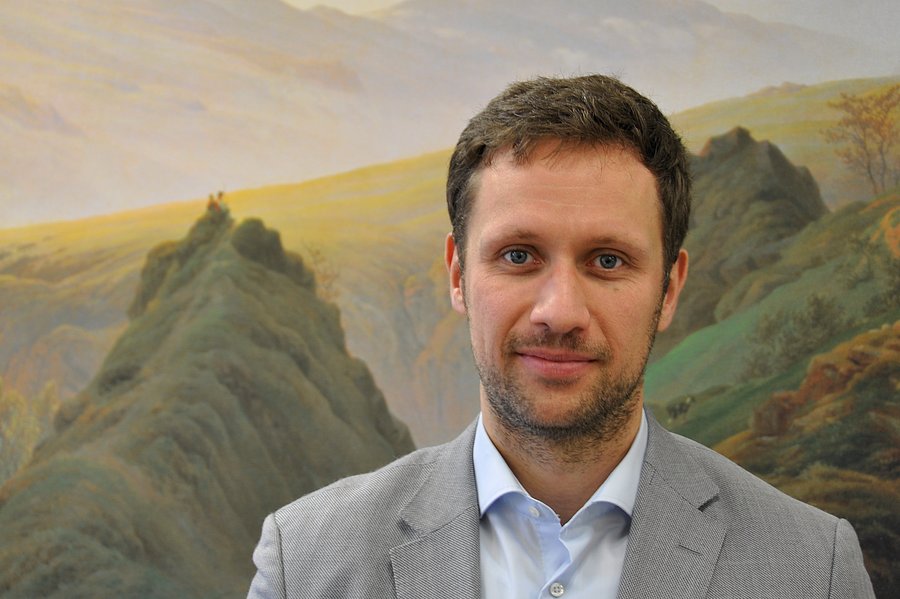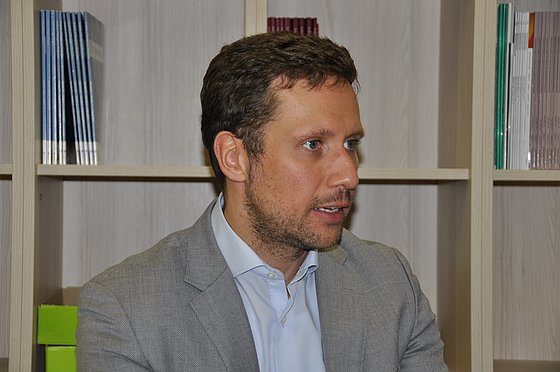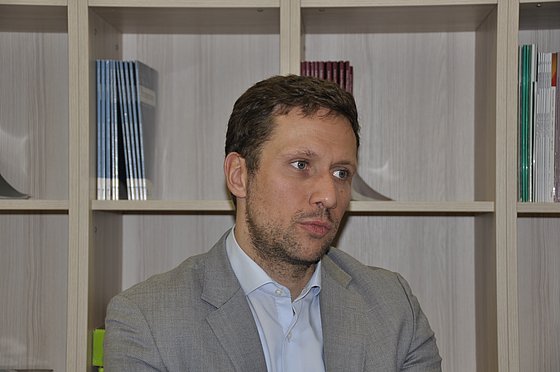
Prof. Dr. Stefan Diestel / Work and Organisational Psychology
Photo: UniService Transfer
Fulfilled work needs ensure stable health
A transfer discussion with the Chair of Work, Organisational and Business Psychology, Professor Dr Stefan Diestel
In international comparison, Germans tend to be punctual, reliable and hard-working, they have no sense of humour and are always stressed and distant. This prejudice harbours a lot of clichés that the industrial, organisational and business psychologist Stefan Diestel does not accept. "Studies comparing cultures occasionally show certain personality differences depending on the federal state or origin, but I wouldn't reduce them to such simple behavioural patterns." Professor Diestel refers to a recent study that describes significant personality differences within Germany depending on the federal state, but emphasises that "you have to imagine that personalities are also shaped by communication processes, perception processes, self-assessment and assessment by others. In other words, what I am on the outside is also partly determined by the social environment in which I move. And I can accept such ascriptions and attributions when I identify myself as German or as German. That is the question of social identity. We humans categorise ourselves."
Ethical leadership
At the beginning of this year, the 36-year-old took over the chair in the Schumpeter School of Business and Economics at the University of Wuppertal, whose research also focuses on ethical leadership in organisations. The behavioural patterns mentioned at the beginning of this article can also be found in leadership styles in companies, which the scientist examines and illustrates in an advisory capacity to the company to be optimised. "Leadership styles describe patterns of leadership behaviour, i.e. the extent to which a manager behaves fairly, justly or, on the other hand, arbitrarily or authoritatively towards their employees. Ethical leadership styles are based on the idea that the manager can be a role model in matters of ethical integrity and moral principles. The interest in ethical leadership results not least from the numerous scandals that we have experienced in recent years," explains Diestel. Events such as the emissions scandal and Brexit, or politicians such as Donald Trump or Recep Tayyip Erdogan, have led to a lack of ethical behaviour, which is always associated with a role model function.
Differentiated analyses can prevent burnout
One example from basic psychological research that can be applied to the world of work and business is the phenomenon of burnout. The occupational psychologist formulates the much-discussed topic, which some doctors, therapists and psychiatrists still regard as a form of depression, as follows: "Burnout is made up of the symptoms of emotional exhaustion, cynicism and lack of personal fulfilment." Through risk assessments or employee surveys, which psychologists carry out in companies, for example, they are able to record the perception of such symptoms. Aspects such as strong effort, controlled emotions, aplomb in the face of inappropriate behaviour from my counterpart, which we commonly refer to as self-control, can exhaust limited resources. Diestel explains: "I can demonstrate this in the company. If people report very strong burnout symptoms, I can link this perception to such professional stress."
In his field of research, Diestel and his team at the chair develop practical solutions for current issues and problems in the world of work and business. The individual approach is crucial here. "There is no one solution that fits all companies. Every company has its own profile, its own portfolio and its own culture. You have to develop such solutions depending on the needs of a company and the needs of individual people who work or are hired by the company." Diestel always starts by asking a lot of questions. "I never go into companies with ready-made concepts or solutions, but try to find out the concerns of the various stakeholders in the
company," he explains. He and his team approach the management, staff representatives and employees of the respective company in equal measure. "Even the questions are developed individually for the company. And afterwards, on the basis of very differentiated statistics, I have the opportunity to make statements about the extent to which the company and the workforce are developing favourably or less favourably with regard to their own health or performance. In turn, I can use these results to derive customised measures for occupational health management with a focus on prevention, motivation and vitality."

Prof. Dr. Stefan Diestel / Work and Organisational Psychology
Photo: UniService Transfer
Education at an understandable level
The human component is also the key success factor in the digitalisation debate. Diestel names three factors that should be taken into account in the context of digital transformation: Leadership and corporate management through strategies, the fear of digitalisation and the development of a fundamental understanding of what digitalisation can achieve. "Companies need to develop strategies or solutions that allow them to implement digital technologies in their own business processes or generate new hybrid business models with digital perspectives," he says, directly addressing the target group of managing directors and managers. "It's not enough to apply agile methods, but also to ask yourself to what extent certain methods, technologies or solutions can actually contribute to an innovative improvement or renewal of your own business models," he explains. This requires a business model that builds on existing processes and develops new solutions, products and services in parallel, because, continues Diestel, "digital technologies enable me to expand my business portfolio."
Another aspect that should not be underestimated is employees' fear of digitalisation. "Large parts of the workforce in the companies that I have accompanied so far are afraid of systems, software and algorithms that they themselves can no longer understand in part." People are often no longer able to grasp the extent of automation and if information is not provided at an understandable level, we react with rejection and fear. "We know from research into change management," explains the psychologist, "that when you initiate and realise change processes in a company, you have to do some psychological groundwork. And this often consists of motivating, reducing fears and providing a certain sense of security." This newly gained security can then open up new possibilities and opportunities within the company.
What can digitalisation actually achieve?
Diestel sees the fundamental understanding of what digitalisation can actually achieve as a key research question that still needs to be developed in theories through an interdisciplinary exchange between colleagues from the fields of computer science, psychology, economics, medicine and biology. For Diestel, the focus here is "on the difference between human thought and information processing on the one hand and the numerous digitalised algorithms and the potential of artificial intelligence on the other."

Prof. Dr. Stefan Diestel / Work and Organisational Psychology
Photo: UniService Transfer
Influences of personality on work behaviour
In the winter semester 19/20, Professor Diestel is offering a seminar entitled "Influences of personality on work behaviour and experience". He answers the question of what influence personality has on work behaviour as follows: "Personality has a demonstrably significant influence on what we do at work. And the question is, what does personality actually mean?" From a psychological perspective, the researcher takes a more nuanced view of the usual association with strength of character. He says: "The way we decide, adapt, process information or translate tasks into goals is very much dependent on the dynamic basic structures of our personality. How are we motivated? How are we influenced by moods or emotions? Are we someone who approaches others in an extroverted manner, or are we more reserved and cautious? How do we deal with difficult emotional situations? Do we have strong willpower, do we have self-discipline? All these factors influence our decisions at work." There are also factors such as intelligence, creativity and, not to be underestimated, the balance between private and working life. In the course, he will use an unusual personality model that understands personality as a dynamic concept. "And this is incredibly important and interesting from the perspective of personnel development, leadership and coaching."
Three fulfilled basic needs ensure stable health
Diestel makes it clear: "According to the theory of self-determination, everyone has three basic needs, regardless of age, gender or ethnic origin. The need for autonomy: we strive to make our own independent decisions. The need for achievement and competence, because everyone has skills and competences that they want to demonstrate, and finally the need for social relationships. Everyone wants to feel integrated, to feel understood by others, to enter into trusting relationships with others," he summarises, who fulfils these "if you are able to fulfil these needs at work, you develop stable health and are very productive over longer periods of time."
Uwe Blass (interview from 8 October 2019)
Prof. Dr Stefan Diestel studied psychology with a focus on business psychology and organisational consulting at Ruhr University Bochum, where he also completed his doctorate. He has held the Chair of Work, Organisational and Business Psychology at the University of Bochum since 2019.
